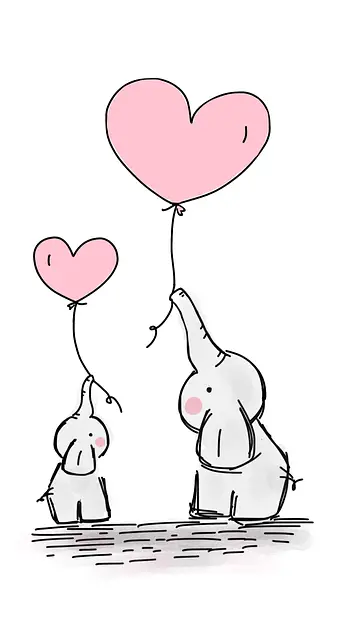Happiness is a long-lasting state of being content with life, whereas excitement is a short-lived burst of energy that comes from external events or experiences.
What is happiness?
(Image by MJ Jin from Pixabay )

Happiness is a complex emotion that can be difficult to define. At its core, happiness is a feeling of contentment and fulfillment that comes from within. It’s not something we can buy or acquire from external sources, but rather something we cultivate within ourselves.
There are many factors that contribute to our overall sense of happiness. These include our relationships with others, our health and well-being, our personal values and beliefs, and the activities we engage in on a regular basis.
One common misconception about happiness is that it’s a constant state of being. In reality, it’s more like an ebb and flow – there will always be ups and downs in life that affect how we feel.
Ultimately, achieving happiness requires self-awareness and intentional effort. By focusing on the things that bring us joy and purpose in life, cultivating positive relationships with others, practicing gratitude regularly, and prioritizing self-care habits such as exercise or meditation ,we can boost our overall sense of well-being over time.
What is excitement?
(Photo by Micah Tindell on Unsplash )

Excitement is an intense feeling of enthusiasm or eagerness towards something that’s about to happen. It can manifest in various ways, from a rush of adrenaline to butterflies in the stomach. Excitement often comes with anticipation and expectation, as it usually builds up before a significant event or experience.
When you’re excited, your body releases dopamine, a neurotransmitter associated with pleasure and reward. This chemical reaction can make you feel happy and motivated, which is why excitement is often linked to positive emotions.
Excitement can come from different sources – it could be related to personal achievements like getting a promotion at work or reaching a fitness goal; it could also stem from external events such as concerts, sports games, vacations, or even surprises.
While excitement is generally considered a positive emotion because it brings joy and motivation into our lives, there are instances where too much excitement can lead to anxiety and stress. For example, when we’re waiting for important news or uncertain outcomes that may impact our lives significantly.
Happiness Vs. Excitement – Key differences
Happiness and excitement are two emotions that often get confused. While both may feel good, the key differences lie in their essence and duration.
Happiness is a long-lasting state of contentment, satisfaction, and fulfillment. It doesn’t depend on external factors or events; rather it comes from within oneself. Happiness can be achieved through practicing gratitude, finding purpose in life, nurturing relationships with loved ones, and engaging in activities that bring joy.
On the other hand, excitement is a short-lived feeling of anticipation or thrill brought about by external stimuli such as events or experiences. Excitement may give an adrenaline rush but fades away quickly once the event ends. Excitement can be fun but it shouldn’t be relied upon for lasting happiness.
The key difference between happiness and excitement lies in their duration; while one lasts longer than the other does not diminish its importance. Happiness provides an overall sense of well-being whereas excitement provides temporary pleasure.
While both happiness and excitement have their place within our lives – they serve different purposes. Pursuing long-term goals to achieve overall satisfaction will lead to greater levels of happiness which cannot easily fade away like just any exciting moment could do so instantly!
How to achieve both happiness and excitement in life
One way to achieve both happiness and excitement in life is by setting goals for yourself. Having something to work towards can bring a sense of purpose and fulfillment, while also creating anticipation and excitement as you work towards achieving those goals.
Another way is to try new things and step out of your comfort zone. This could be anything from trying a new hobby or activity, traveling somewhere you’ve never been before, or even just striking up a conversation with someone new. These experiences can bring a sense of adventure and excitement to your life, while also potentially leading to personal growth and discovery.
It’s important not to overlook the small moments of happiness that happen every day as well. Taking time to appreciate the simple pleasures in life – like spending time with loved ones or enjoying nature – can help cultivate an overall sense of contentment and joy.
Practicing gratitude can have a significant impact on both happiness and excitement levels. Focusing on what you’re grateful for instead of what you lack cultivates positivity in everyday situations which lead us into feeling more excited about our future plans too!
Is excitement always positive?
Excitement is often associated with positive emotions such as joy, anticipation and enthusiasm. However, excitement can also be negative depending on the situation. For example, excitement can arise from fear or anxiety which may result in a negative outcome.
When we experience excitement, our body releases adrenaline which triggers a fight or flight response. This physical reaction can be stressful if we are not mentally prepared to handle it.
Moreover, excessive excitement can lead to impulsive behavior where individuals act without thinking about the consequences of their actions. In some cases, this impulsivity can lead to regretful decisions that have long-lasting effects.
On the other hand, healthy levels of excitement are beneficial for our mental well-being as they provide motivation and energy towards achieving goals. Excitement helps us stay engaged in life by providing new experiences and challenges that keep things interesting.
Therefore, while it’s important to embrace exciting moments in life positively, it’s equally vital to manage our emotions during those times and avoid being overwhelmed by them. By doing so we ensure that we maintain balance between the pros and cons of experiencing both positive and negative types of excitements in life.
What are the 4 types of happiness?
When it comes to happiness, there isn’t a one-size-fits-all solution. In fact, researchers have identified four distinct types of happiness that people experience.
The first type is called “pleasure” or “hedonic” happiness. This refers to the joy we feel from pleasure-seeking activities like eating our favorite foods or engaging in hobbies we enjoy.
The second type is referred to as “engagement” or “flow” happiness. This happens when we are so absorbed in an activity that time seems to fly by and our worries fade away.
Thirdly, there’s “meaningful” or “eudaimonic” happiness which comes from a sense of purpose and fulfillment in life. It arises when we feel connected with others, make meaningful contributions to society and live according to our values.
There’s the fourth type: spiritual happiness. This involves finding contentment through religious beliefs or meditation practices and can help provide stability during times of stress.
Understanding these different types of happiness can be helpful for individuals seeking greater satisfaction in their lives. By acknowledging what brings us joy – whether it be pleasure-based activities, personal development experiences or meaningful connections with others – we can work towards achieving a more fulfilling life overall.
featured Images By – KAL VISUALS on Unsplash








